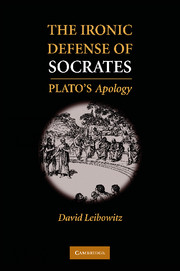Book contents
- Frontmatter
- Contents
- Acknowledgments
- Introduction
- 1 Title and Preliminary Considerations
- 2 Prooemium (17a1–18a6)
- 3 Prothesis (18a7–19a7)
- 4 Defense against the Charges of the First Accusers (19a8–24b2)
- 5 Defense against the Present Accusers (24b3–28b2)
- 6 Second Digression (28b3–34b5)
- 7 Epilogue (34b6–35d8)
- 8 Penalty Section (35e1–38b9)
- 9 Final Speech (38c1–42a5)
- 10 Conclusion
- Short Titles
- Bibliography
- Index
8 - Penalty Section (35e1–38b9)
Published online by Cambridge University Press: 05 August 2011
- Frontmatter
- Contents
- Acknowledgments
- Introduction
- 1 Title and Preliminary Considerations
- 2 Prooemium (17a1–18a6)
- 3 Prothesis (18a7–19a7)
- 4 Defense against the Charges of the First Accusers (19a8–24b2)
- 5 Defense against the Present Accusers (24b3–28b2)
- 6 Second Digression (28b3–34b5)
- 7 Epilogue (34b6–35d8)
- 8 Penalty Section (35e1–38b9)
- 9 Final Speech (38c1–42a5)
- 10 Conclusion
- Short Titles
- Bibliography
- Index
Summary
Right after the vote to convict him, Socrates says that he is not indignant at what has happened, in part because it was “not unexpected” by him (35e9–36a3; cf. 41d3–7). The Greek words “not unexpected” can also mean “not unhoped for.” In other words, he indicates that the trial is going as he wants it to. He expresses surprise, however, at the closeness of the vote. To guarantee the outcome he seeks, will he have to increase the level of provocation?
Now that he has been found guilty, the question is what the penalty should be. The prosecution has said death. After Socrates makes a counterproposal, the jury will vote again. Socrates deliberates aloud about what he deserves, and his conclusion is free meals at public expense in the Prytaneum, where Olympic victors are fed (36e1–37a1). And why does he deserve this? Because he makes the Athenians happy, presumably by making them virtuous (cf. 30b2–4). This accords with the second account of his activity: he spends the whole of each day exhorting everyone he meets to virtue (36d4–5; 30a2–4, 30a7–b2, 30e7–31a1, 31b4–6). Now on the one hand his proposal is comic: he makes the Athenians so happy that they want to kill him, and they should punish him by making it easier for him to do the very things that led to his conviction (cf. 36d1–e1 with 38b1–2).
- Type
- Chapter
- Information
- The Ironic Defense of SocratesPlato's Apology, pp. 161 - 165Publisher: Cambridge University PressPrint publication year: 2010



